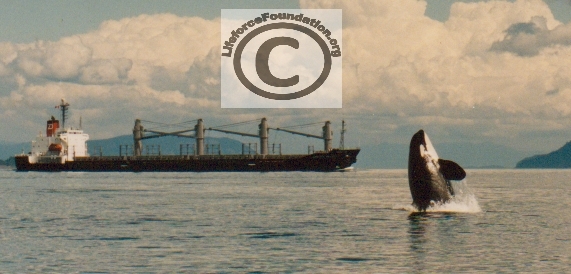|
|
Fate Of Puget Sound Orcas Hangs In The Balance
posted on December 20, 2005

December 18, 2005 (Bellingham Herald)
Researchers estimate that as many as 100 orcas [actually at least 120] used to ply the inland waters south of Vancouver Island looking for now-threatened chinook salmon, their dietary mainstay. But by 1976, the population dropped to 68 after years of marine park captures killed at least 13 whales [and delivered 45 to marine parks], according to the Center for Whale Research.
Lolita is the last surviving orca of about 45 southern resident whales captured. She lives at the Miami (Fla.) Seaquarium.
The 2005 population count is back up to 90 whales [now at 87], according to the center, but the condition of their environment may hinder their chances for survival.
"To see them - they are beautiful and graceful to look at," says Bob Lohn, the northwest regional administrator of the National Marine Fisheries Service. "They are creatures that in some way we can identify with because they have language, curiosity, feelings, intelligence." And they are mysterious.
Little is known about where the southern resident orcas spend their winters or how they breed, Lohn says. The endangered listing should help funnel more money into much-needed studies. [Please call 1-866-ORCANET (866-672-2638) with whale sightings]
But researchers do know that the southern resident population travels in three family groups, the J, K and L pods. During summer months, the orcas can be seen in Haro Strait off the west coast of San Juan Island, in the Strait of Juan de Fuca, and in the Georgia Strait near the Fraser River.
"Once you've heard them, it's hard not to recognize them as a creature with emotions who is expressing them," he says.
What finally landed the southern residents on the endangered species list was the recent conclusion that they are different - their diet, territory and family units are distinct from even their close neighbors, the northern residents in Canada.
Other orcas, called transients, might come into resident whale territory, but they don't stick around for long, Lohn says. They often will enter Puget Sound while chasing a sea otter or sea lion meal. Those creatures aren't on the menu for the salmon-chomping resident whales.
Researchers also have learned that the resident whales have a unique language of chirps, squeals and whines, and even specific dialects within the individual pods. Southern residents are believed to return to the Puget Sound area every year because they are wired to follow local runs of threatened chinook salmon.
That uniqueness brings into sharp focus the precarious situation of the orcas, says Lohn. Once they're gone, other orcas won't take their place.
There are at least three official areas of concern: a dwindling supply of salmon for food, contaminants accumulating in whale blubber, and boats and ships physically interfering with whales and disturbing them with engine noise.
The deaths of 11 orcas from an Alaska pod - about half its members - have been blamed on the 1989 Exxon Valdez oil spill that dumped at least 11 million gallons of crude oil into Prince William Sound.
"One incident like a major oil spill could wipe them out entirely," Hamilton says. |
| |
| |
|
|